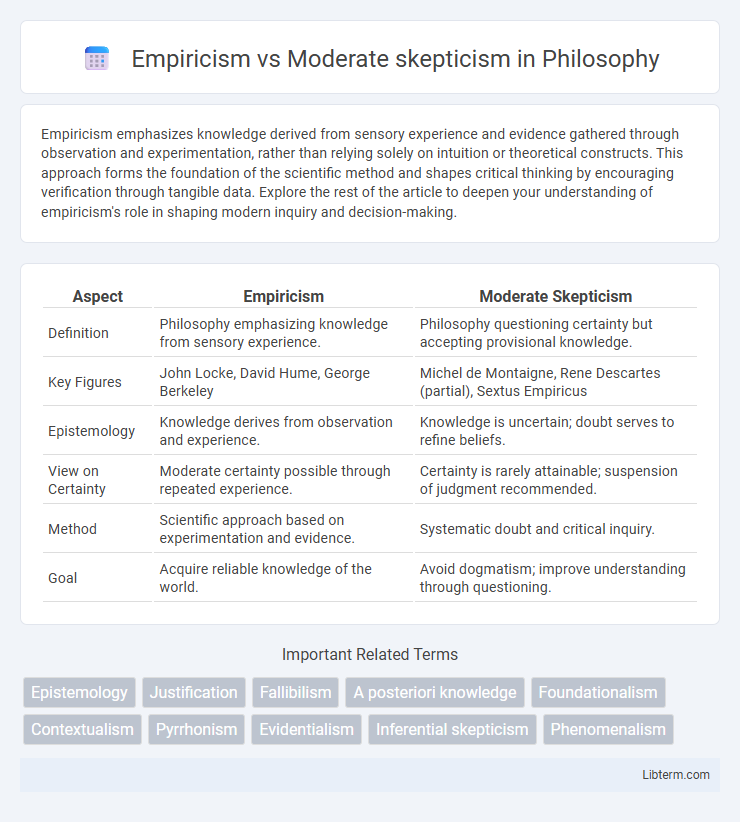Empiricism emphasizes knowledge derived from sensory experience and evidence gathered through observation and experimentation, rather than relying solely on intuition or theoretical constructs. This approach forms the foundation of the scientific method and shapes critical thinking by encouraging verification through tangible data. Explore the rest of the article to deepen your understanding of empiricism's role in shaping modern inquiry and decision-making.
Table of Comparison
| Aspect | Empiricism | Moderate Skepticism |
|---|---|---|
| Definition | Philosophy emphasizing knowledge from sensory experience. | Philosophy questioning certainty but accepting provisional knowledge. |
| Key Figures | John Locke, David Hume, George Berkeley | Michel de Montaigne, Rene Descartes (partial), Sextus Empiricus |
| Epistemology | Knowledge derives from observation and experience. | Knowledge is uncertain; doubt serves to refine beliefs. |
| View on Certainty | Moderate certainty possible through repeated experience. | Certainty is rarely attainable; suspension of judgment recommended. |
| Method | Scientific approach based on experimentation and evidence. | Systematic doubt and critical inquiry. |
| Goal | Acquire reliable knowledge of the world. | Avoid dogmatism; improve understanding through questioning. |
Introduction to Empiricism and Moderate Skepticism
Empiricism emphasizes knowledge derived primarily from sensory experience, asserting that observation and experimentation form the foundation of understanding reality. Moderate skepticism questions the certainty of knowledge claims, advocating for a cautious approach that seeks justification while acknowledging the possibility of error. This philosophical interplay highlights the balance between trusting empirical evidence and critically evaluating its limitations.
Historical Roots and Philosophical Background
Empiricism emerged prominently in the 17th century with philosophers like John Locke and David Hume emphasizing sensory experience as the primary source of knowledge. Moderate skepticism traces back to ancient Greek philosophers such as Pyrrho and Sextus Empiricus, who questioned the certainty of knowledge but did not advocate for complete doubt. The historical roots of these epistemological positions reveal a dynamic interplay between trusting empirical evidence and critically evaluating the limits of human cognition.
Core Principles of Empiricism
Empiricism centers on the belief that knowledge primarily originates from sensory experience and observation, emphasizing evidence gathered through the five senses as the foundation for understanding reality. Core principles include the rejection of innate ideas, reliance on inductive reasoning to derive generalizations from specific data, and the acceptance that all concepts and knowledge must be verifiable through empirical investigation. This contrasts with moderate skepticism, which questions the certainty of knowledge claims but does not dismiss the possibility of acquiring justified beliefs through empirical methods.
Key Tenets of Moderate Skepticism
Moderate skepticism emphasizes the limitation of human knowledge, asserting that absolute certainty is unattainable while still allowing for probabilistic beliefs based on evidence. Unlike empiricism, which relies on sensory experience as the foundation of knowledge, moderate skepticism maintains that senses can be deceptive and encourages ongoing inquiry and critical evaluation of claims. Key tenets include the suspension of judgment (epoche) in the face of ambiguity and the pursuit of reasonable doubt rather than total disbelief.
Methodological Differences
Empiricism centers on acquiring knowledge through sensory experience and observation, emphasizing inductive reasoning and experimentation as primary methods to validate claims. Moderate skepticism involves questioning the certainty of knowledge while allowing some beliefs to be tentatively accepted based on evidence, employing a cautious, reflective approach that prioritizes critical analysis over immediate acceptance. The methodological difference lies in empiricism's reliance on empirical data and systematic testing versus moderate skepticism's emphasis on doubt and demand for rigorous justification before endorsing any claim.
Epistemological Implications
Empiricism emphasizes knowledge acquisition through sensory experience, asserting that all ideas derive from observable phenomena, which strengthens the foundation for scientific inquiry and empirical verification. Moderate skepticism challenges the certainty of knowledge claims, promoting a cautious approach to belief formation by questioning the reliability and limitations of sensory data. Together, these perspectives highlight epistemological tensions between confidence in empirical evidence and the need for critical scrutiny to avoid dogmatism and ensure justified true belief.
Applications in Scientific Inquiry
Empiricism emphasizes observation and experimental data as the foundation of scientific knowledge, driving methodologies that rely on measurable evidence and repeatability. Moderate skepticism encourages critical examination of findings to avoid assumptions and biases, promoting continuous testing and validation of hypotheses. Together, these approaches enhance the robustness and credibility of scientific inquiry by balancing trust in sensory data with caution against premature conclusions.
Prominent Philosophers and Thinkers
Prominent empiricists such as John Locke, George Berkeley, and David Hume emphasized knowledge acquisition through sensory experience and observation, asserting that ideas derive from tangible interactions with the world. In contrast, moderate skeptics like Sextus Empiricus and Michel de Montaigne questioned the certainty of knowledge claims, advocating for suspension of judgment to avoid dogmatism while still allowing for practical inquiry. This philosophical tension highlights the empirical reliance on sensory data versus skeptical caution regarding the limits of human cognition and the possibility of absolute knowledge.
Strengths and Limitations Compared
Empiricism emphasizes knowledge gained through sensory experience, offering a robust method for scientific inquiry and practical understanding, but its limitation lies in the potential unreliability of sensory data and difficulty addressing abstract concepts. Moderate skepticism encourages critical evaluation of knowledge claims, helping to identify biases and avoid false beliefs, yet it can lead to excessive doubt that may inhibit knowledge acceptance and hinder decisive conclusions. Both approaches balance the pursuit of truth by either trusting empirical evidence or questioning its certainty, highlighting the trade-off between confidence in sensory data and caution against its fallibility.
Conclusion: Reconciling Empiricism and Moderate Skepticism
Reconciling empiricism and moderate skepticism involves recognizing that knowledge derives from sensory experience while maintaining a cautious stance toward absolute certainty. Empiricism's reliance on observation supports the acquisition of reliable information, whereas moderate skepticism tempers claims by questioning the limits and potential errors of human perception. This balanced approach fosters critical inquiry and continuous validation, enhancing epistemic humility without dismissing empirical evidence.
Empiricism Infographic

 libterm.com
libterm.com